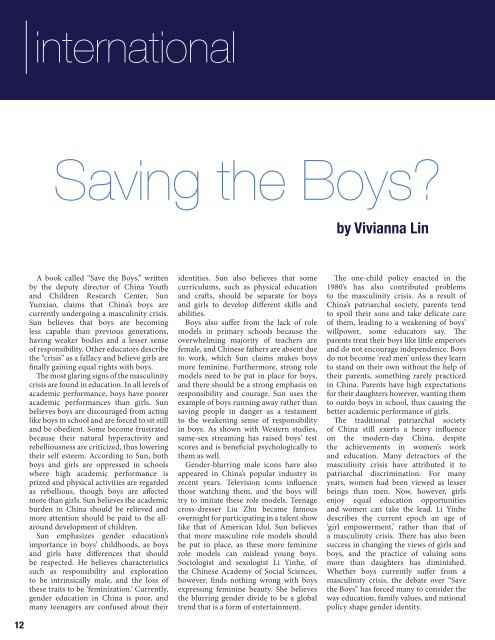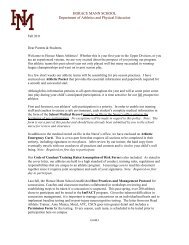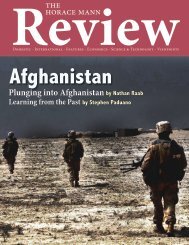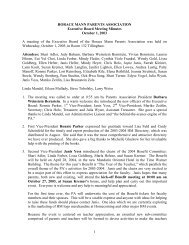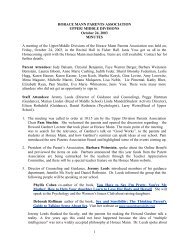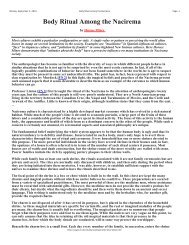horace mann school's publication for gender issues
horace mann school's publication for gender issues
horace mann school's publication for gender issues
Create successful ePaper yourself
Turn your PDF publications into a flip-book with our unique Google optimized e-Paper software.
Opinions arts <strong>horace</strong> international <strong>mann</strong><br />
international<br />
Saving the Boys<br />
by Vivianna Lin<br />
A book called “Save the Boys,” written<br />
by the deputy director of China Youth<br />
and Children Research Center, Sun<br />
Yunxiao, claims that China’s boys are<br />
currently undergoing a masculinity crisis.<br />
Sun believes that boys are becoming<br />
less capable than previous generations,<br />
having weaker bodies and a lesser sense<br />
of responsibility. Other educators describe<br />
the “crisis” as a fallacy and believe girls are<br />
finally gaining equal rights with boys.<br />
The most glaring signs of the masculinity<br />
crisis are found in education. In all levels of<br />
academic per<strong>for</strong>mance, boys have poorer<br />
academic per<strong>for</strong>mances than girls. Sun<br />
believes boys are discouraged from acting<br />
like boys in school and are <strong>for</strong>ced to sit still<br />
and be obedient. Some become frustrated<br />
because their natural hyperactivity and<br />
rebelliousness are criticized, thus lowering<br />
their self esteem. According to Sun, both<br />
boys and girls are oppressed in schools<br />
where high academic per<strong>for</strong>mance is<br />
prized and physical activities are regarded<br />
as rebellious, though boys are affected<br />
more than girls. Sun believes the academic<br />
burden in China should be relieved and<br />
more attention should be paid to the allaround<br />
development of children.<br />
Sun emphasizes <strong>gender</strong> education’s<br />
importance in boys’ childhoods, as boys<br />
and girls have differences that should<br />
be respected. He believes characteristics<br />
such as responsibility and exploration<br />
to be intrinsically male, and the loss of<br />
these traits to be ‘feminization.’ Currently,<br />
<strong>gender</strong> education in China is poor, and<br />
many teenagers are confused about their<br />
identities. Sun also believes that some<br />
curriculums, such as physical education<br />
and crafts, should be separate <strong>for</strong> boys<br />
and girls to develop different skills and<br />
abilities.<br />
Boys also suffer from the lack of role<br />
models in primary schools because the<br />
overwhelming majority of teachers are<br />
female, and Chinese fathers are absent due<br />
to work, which Sun claims makes boys<br />
more feminine. Furthermore, strong role<br />
models need to be put in place <strong>for</strong> boys,<br />
and there should be a strong emphasis on<br />
responsibility and courage. Sun uses the<br />
example of boys running away rather than<br />
saving people in danger as a testament<br />
to the weakening sense of responsibility<br />
in boys. As shown with Western studies,<br />
same-sex streaming has raised boys’ test<br />
scores and is beneficial psychologically to<br />
them as well.<br />
Gender-blurring male icons have also<br />
appeared in China’s popular industry in<br />
recent years. Television icons influence<br />
those watching them, and the boys will<br />
try to imitate these role models. Teenage<br />
cross-dresser Liu Zhu became famous<br />
overnight <strong>for</strong> participating in a talent show<br />
like that of American Idol. Sun believes<br />
that more masculine role models should<br />
be put in place, as these more feminine<br />
role models can mislead young boys.<br />
Sociologist and sexologist Li Yinhe, of<br />
the Chinese Academy of Social Sciences,<br />
however, finds nothing wrong with boys<br />
expressing feminine beauty. She believes<br />
the blurring <strong>gender</strong> divide to be a global<br />
trend that is a <strong>for</strong>m of entertainment.<br />
The one-child policy enacted in the<br />
1980’s has also contributed problems<br />
to the masculinity crisis. As a result of<br />
China’s patriarchal society, parents tend<br />
to spoil their sons and take delicate care<br />
of them, leading to a weakening of boys’<br />
willpower, some educators say. The<br />
parents treat their boys like little emperors<br />
and do not encourage independence. Boys<br />
do not become ‘real men’ unless they learn<br />
to stand on their own without the help of<br />
their parents, something rarely practiced<br />
in China. Parents have high expectations<br />
<strong>for</strong> their daughters however, wanting them<br />
to outdo boys in school, thus causing the<br />
better academic per<strong>for</strong>mance of girls.<br />
The traditional patriarchal society<br />
of China still exerts a heavy influence<br />
on the modern-day China, despite<br />
the achievements in women’s work<br />
and education. Many detractors of the<br />
masculinity crisis have attributed it to<br />
patriarchal discrimination. For many<br />
years, women had been viewed as lesser<br />
beings than men. Now, however, girls<br />
enjoy equal education opportunities<br />
and women can take the lead. Li Yinhe<br />
describes the current epoch an age of<br />
‘girl empowerment,’ rather than that of<br />
a masculinity crisis. There has also been<br />
success in changing the views of girls and<br />
boys, and the practice of valuing sons<br />
more than daughters has diminished.<br />
Whether boys currently suffer from a<br />
masculinity crisis, the debate over “Save<br />
the Boys” has <strong>for</strong>ced many to consider the<br />
way education, family values, and national<br />
policy shape <strong>gender</strong> identity.<br />
12


